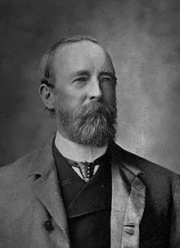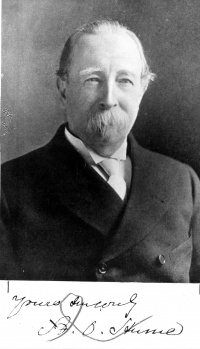Allan Octavian Hume
Allan Octavian Hume (6 June 1829 - 31 July 1912) was a civil servant, political reformer and amateur ornithologist and horticulturalist in British India. He was one of the founders of the Indian National Congress, a political party that was later to lead the Indian independence movement. A notable ornithologist, Hume has been called "the Father of Indian Ornithology" and, by those who found him dogmatic, "the Pope of Indian ornithology."[1]
Early Life
A. O. Hume was born in St Mary Cray, Kent, on 6 June 1829. He was the grandson of an East India Company director. He was educated at East India Company College, Haileybury, and then at University College Hospital, in London, where he studied medicine and surgery. In 1853 he married Mary Anne Grindall.
Political career
In 1849 young Hume sailed to India and the following year joined the Bengal Civil Service. In his early service as a District Officer he began introducing free primary education and creating a local vernacular newspaper, Lokmitra (The People's Friend) in Etawah, the town of present-day Uttar Pradesh. He also founded scholarships for higher education, and maintained that education would play a key role in avoiding revolts like the Indian Rebellion of 1857. In 1863 he moved for separate schools for juvenile delinquents rather than imprisonment. His efforts led to a juvenile reformatory. By 1857 he established 181 schools with 5186 students including two girls. With his progressive ideas about social reform, he advocated women's education, was against infanticide and enforced widowhood.
Hume laid out in Etawah a commercial district known as Humeganj. The high school that he helped build with his own money is still in operation, now as a junior college, and it was said to have a floor plan resembling the letter H. This, according to some was an indication of Hume's imperial ego.[1]
By 1870 he had risen to become Director-General of Agriculture in the central government. But he was having problems with his colleagues, and now his reformist policies became more controversial. He was very outspoken and never feared to criticise when he thought the Government was in the wrong, often intruding into every aspect of administration with his critical opinions.
Hume was critical of the land revenue policy and suggested that it was the cause of poverty in India. Hume proposed to develop fuelwood plantations to provide a substitute heating and cooking fuel so that manure could be returned to the land. His superiors were irritated and attempted to restrict his powers and was eventually demoted. This led him to publish a book on Agricultural Reform in India in 1879. In 1879 he returned to provincial government at Allahabad. He went against the authorities and the Government of Lord Lytton dismissed him from his position in the Secretariat. The press declared that his main wrong doing was that he was too honest and too independent. He finally retired from the civil service in 1882.
In 1883 he wrote an open letter to the graduates of Calcutta University, calling upon them to form their own national political movement. This led in 1885 to the first session of the Indian National Congress held in Bombay.[14] In 1887 he wrote to the Public Commission of India stating — I look upon myself as a Native of India.
Notes
- ↑ Agricultural Development in British India by Bret Wallach.
Further reading
- Triad at Theosopedia

